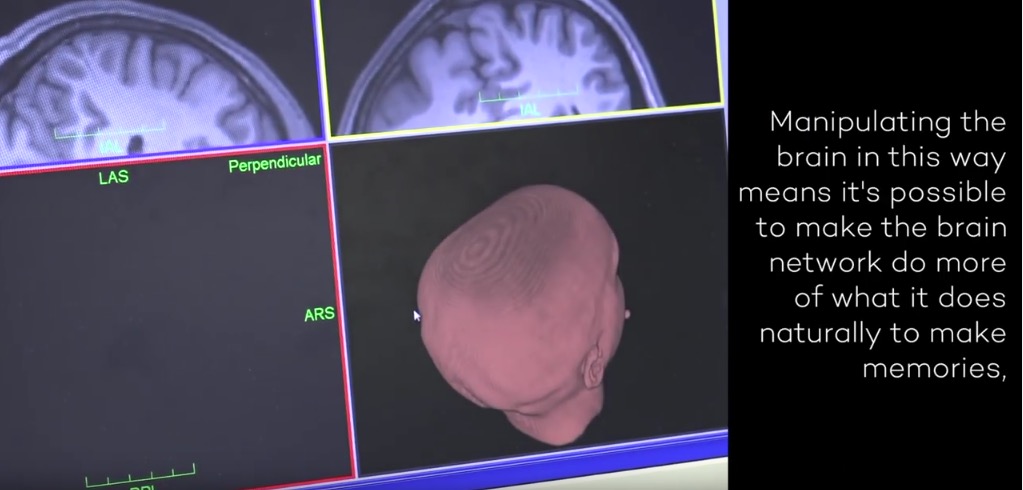Not tDCS, but TMS -Transcranial Magnetic Stimulation, another form of TES – Transcranial Electric Stimulation, that is being used both clinically (FDA approved for the treatment of depression) and as a research tool. Unlike tDCS, TMS can be of sufficient power to cause neurons to fire– imagine a finger twitching in response the the activation of the TMS device.
The video describes an experiment where researchers are attempting to improve the quality of memory encoding using TMS. The point of sharing it with you on the blog is to point out how difficult this is in fact to do. tDCS for cognitive enhancement was what initially inspired this blog, and now these six years later, I’m not sure we’re any closer to having a useful tool for cognitive enhancement of any kind, though I am reasonably confident in stating that tDCS for the treatment of depression is at least worth trying. (Other areas of research I’m more optimistic about are tDCS and Aphasia, tDCS and Parkinson’s, and tDCS for the enhancement of physical training. But in all of these the jury is still out, as there is conflicting research results.)
Note as well in the video the elaborate set up for measuring the effect of TMS in the memory study. These are often standardized tests used throughout psychology research. Unfortunately they are often costly and complicated to use. Point being that any sort of DIY cognitive enhancement experiments need to consider how effects will be measured.

Read more about the research here: Stimulation excites the brain to form better memories
Find the paper here: Selective and coherent activity increases due to stimulation indicate functional distinctions between episodic memory networks
See also: Hippocampal memory encoding and retrieval

Im really surprised that the DIY community isn’t larger than it is because tDCS was so helpful for me treating depression and there are so many people that suffer from it. Plus thats only a small part of what tDCS can do!!! What’s your take on the reason why that is/
Well I think the actual ‘doing of it’ is still a little bit difficult for most people. Then there’s the conflicting research results. A lot of people hear about it through something like Radio Lab or some clickbait article that sensationalizes tDCS and implies significant results… especially around any sort of cognitive enhancement. Then they dig deeper and discover the conflicting research and get distracted. But I agree in regards depression. It should be much more widespread (IMO) as a first choice (rather than last) to try. I’m encouraged by studies like tDCS for depression in pregnant women. Also in Europe, companies have gained approval for depression. Another way I think tDCS could become more mainstream is as an adjunct, or ‘top up’ to TMS-for-depression treatment. TMS is starting to get insurer approval for depression and I hope to see studies showing efficacy of tDCS for maintaining positive results (i.e. lengthening the time before re-treatment). Glad to hear it helped you, and I really get that practicing ARKit will be much easier to make time for if it’s related to something you’re passionate about.
That makes a lot of sense, I have read conflicting studies but it seems, in my opinion, that there isn’t enough standardization in those studies.
I designed a 3D printed headset to work with the app I’m making to try to help take the difficulty out of it, and that combines “games” that uses cognitive emotion training to help sync up the amygdala and prefrontal cortex. It works great for me.
It sounds very interesting. If you want to make a post for the blog, send it as an email john [the at sign] diytdcs.com and I’ll publish it (with maybe a little back and forth editing). Can you send me some photos? I’d like to see that headset.
It is was a way for me to practice using the ARKit with something that I am passionate about, not to make any money. I used tDCS for my depression/anxiety and was able to get off my medication so I would love to make it easier for people like me to try tDCS. Thanks for the advice though!
Im working on using augmented reality with ios 12 ARkit to increase accuracy of electrode placement of the 10 20 system. It’s not as custom as being able to take an MRI but for the DIY community I think it could help. What do you guys think?
Sounds interesting. What is your objective? Personally, I think a lot of what motivates the higher-level MRI/fNIRS targeting is the desire to have devices FDA approved for specific treatments at some point, so I’m not sure how interested the DIYers would be. 10-20 eyeballing it might be ‘good enough’ for them. Also, in the event you thought an app might pay you back for your work, I don’t think the DIY community is as large as some think. That’s my take anyway. But I would also run it by the r/tDCS Reddit sub for feedback.